Health Sociology Essay: Social Determinants and Theories Analysis
VerifiedAdded on 2021/06/16
|7
|1653
|132
Essay
AI Summary
This essay on health sociology delves into the intricate relationship between sociological theories and health outcomes. It begins by emphasizing the influence of sociological determinants on individual well-being, then explores the core concepts of functionalism and conflict theory as they relate to health. The essay examines the functionalist perspective, highlighting its emphasis on societal equilibrium and the roles of physicians and patients, while also acknowledging its limitations. It then contrasts this with the conflict theory, which focuses on inequalities in healthcare access and outcomes based on social factors like caste, creed, sex, and ethnicity. Furthermore, the essay contrasts the biomedical model, which concentrates on physical and biological aspects, with the social model, which considers social determinants such as sanitation and economic factors. The essay concludes by emphasizing the importance of both models, recognizing their distinct perspectives and their contributions to understanding and improving health and well-being within society.
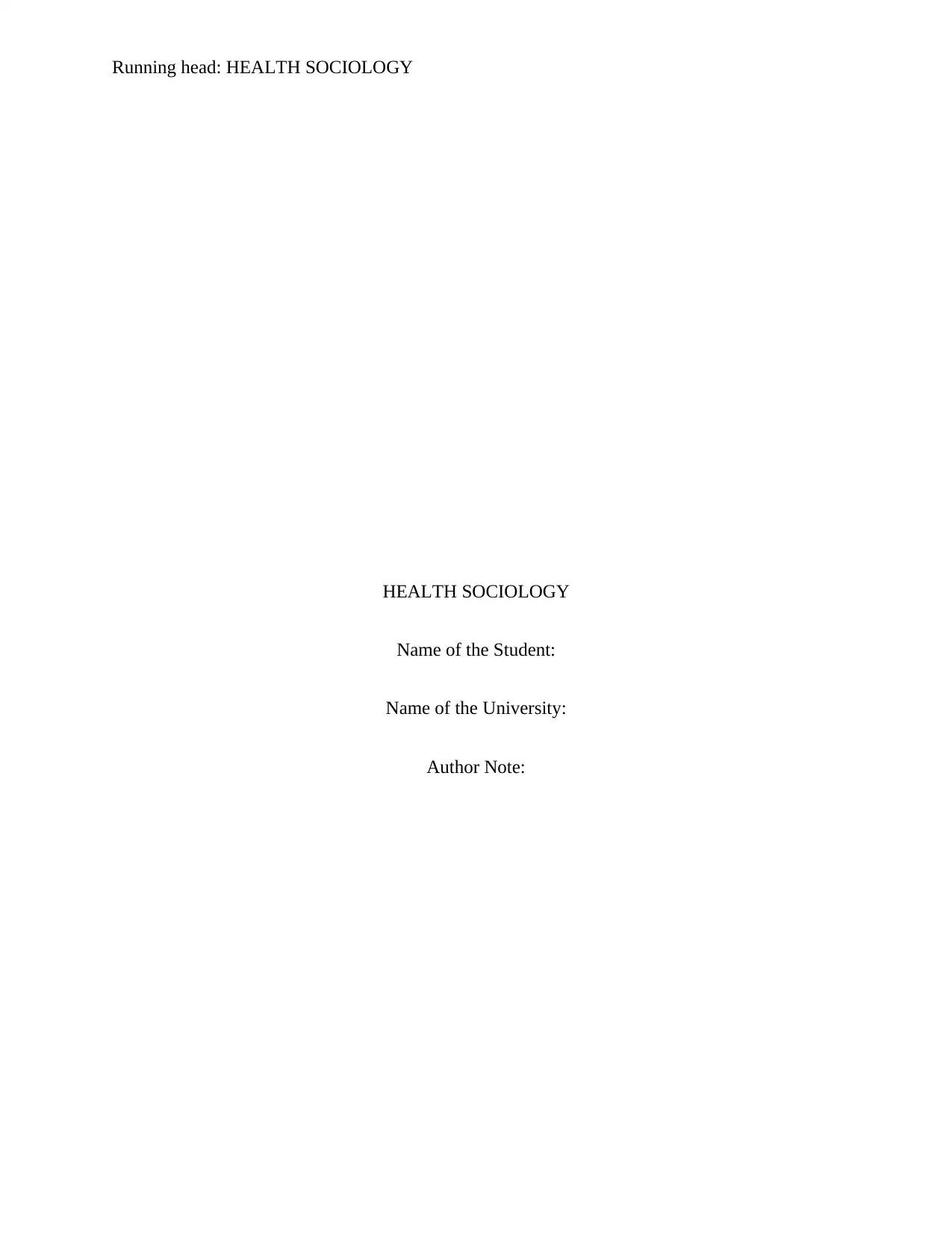
Running head: HEALTH SOCIOLOGY
HEALTH SOCIOLOGY
Name of the Student:
Name of the University:
Author Note:
HEALTH SOCIOLOGY
Name of the Student:
Name of the University:
Author Note:
Paraphrase This Document
Need a fresh take? Get an instant paraphrase of this document with our AI Paraphraser
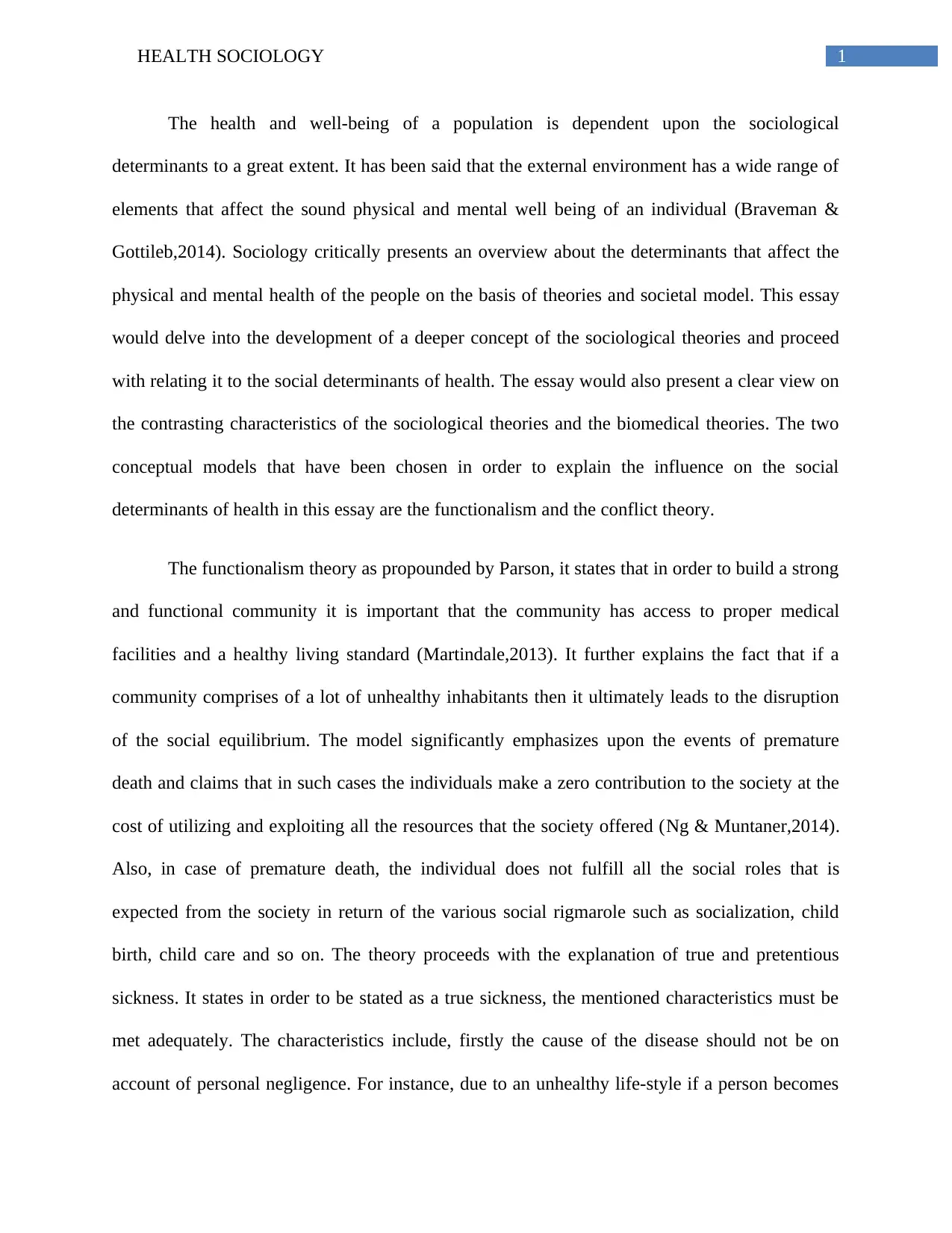
1HEALTH SOCIOLOGY
The health and well-being of a population is dependent upon the sociological
determinants to a great extent. It has been said that the external environment has a wide range of
elements that affect the sound physical and mental well being of an individual (Braveman &
Gottileb,2014). Sociology critically presents an overview about the determinants that affect the
physical and mental health of the people on the basis of theories and societal model. This essay
would delve into the development of a deeper concept of the sociological theories and proceed
with relating it to the social determinants of health. The essay would also present a clear view on
the contrasting characteristics of the sociological theories and the biomedical theories. The two
conceptual models that have been chosen in order to explain the influence on the social
determinants of health in this essay are the functionalism and the conflict theory.
The functionalism theory as propounded by Parson, it states that in order to build a strong
and functional community it is important that the community has access to proper medical
facilities and a healthy living standard (Martindale,2013). It further explains the fact that if a
community comprises of a lot of unhealthy inhabitants then it ultimately leads to the disruption
of the social equilibrium. The model significantly emphasizes upon the events of premature
death and claims that in such cases the individuals make a zero contribution to the society at the
cost of utilizing and exploiting all the resources that the society offered (Ng & Muntaner,2014).
Also, in case of premature death, the individual does not fulfill all the social roles that is
expected from the society in return of the various social rigmarole such as socialization, child
birth, child care and so on. The theory proceeds with the explanation of true and pretentious
sickness. It states in order to be stated as a true sickness, the mentioned characteristics must be
met adequately. The characteristics include, firstly the cause of the disease should not be on
account of personal negligence. For instance, due to an unhealthy life-style if a person becomes
The health and well-being of a population is dependent upon the sociological
determinants to a great extent. It has been said that the external environment has a wide range of
elements that affect the sound physical and mental well being of an individual (Braveman &
Gottileb,2014). Sociology critically presents an overview about the determinants that affect the
physical and mental health of the people on the basis of theories and societal model. This essay
would delve into the development of a deeper concept of the sociological theories and proceed
with relating it to the social determinants of health. The essay would also present a clear view on
the contrasting characteristics of the sociological theories and the biomedical theories. The two
conceptual models that have been chosen in order to explain the influence on the social
determinants of health in this essay are the functionalism and the conflict theory.
The functionalism theory as propounded by Parson, it states that in order to build a strong
and functional community it is important that the community has access to proper medical
facilities and a healthy living standard (Martindale,2013). It further explains the fact that if a
community comprises of a lot of unhealthy inhabitants then it ultimately leads to the disruption
of the social equilibrium. The model significantly emphasizes upon the events of premature
death and claims that in such cases the individuals make a zero contribution to the society at the
cost of utilizing and exploiting all the resources that the society offered (Ng & Muntaner,2014).
Also, in case of premature death, the individual does not fulfill all the social roles that is
expected from the society in return of the various social rigmarole such as socialization, child
birth, child care and so on. The theory proceeds with the explanation of true and pretentious
sickness. It states in order to be stated as a true sickness, the mentioned characteristics must be
met adequately. The characteristics include, firstly the cause of the disease should not be on
account of personal negligence. For instance, due to an unhealthy life-style if a person becomes
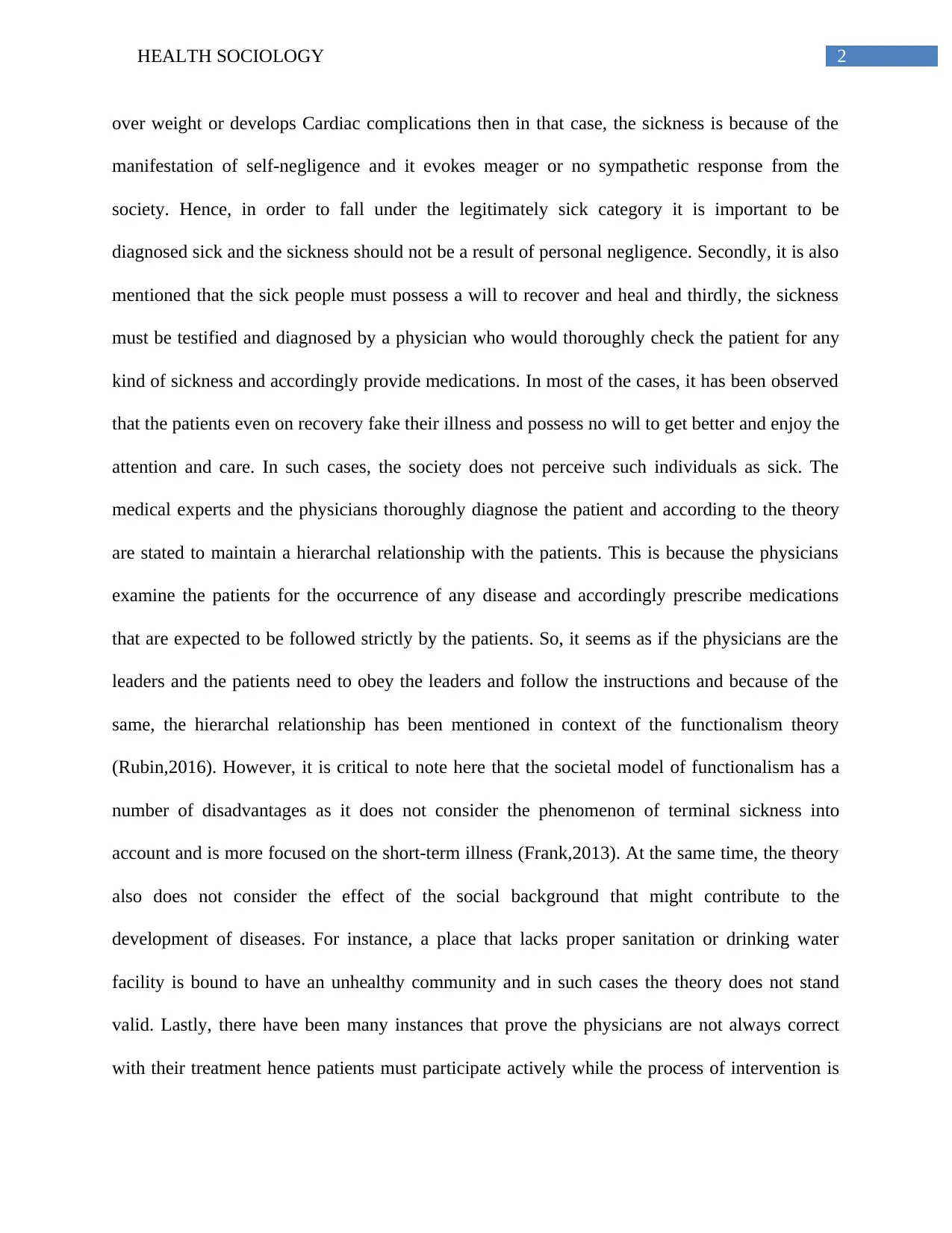
2HEALTH SOCIOLOGY
over weight or develops Cardiac complications then in that case, the sickness is because of the
manifestation of self-negligence and it evokes meager or no sympathetic response from the
society. Hence, in order to fall under the legitimately sick category it is important to be
diagnosed sick and the sickness should not be a result of personal negligence. Secondly, it is also
mentioned that the sick people must possess a will to recover and heal and thirdly, the sickness
must be testified and diagnosed by a physician who would thoroughly check the patient for any
kind of sickness and accordingly provide medications. In most of the cases, it has been observed
that the patients even on recovery fake their illness and possess no will to get better and enjoy the
attention and care. In such cases, the society does not perceive such individuals as sick. The
medical experts and the physicians thoroughly diagnose the patient and according to the theory
are stated to maintain a hierarchal relationship with the patients. This is because the physicians
examine the patients for the occurrence of any disease and accordingly prescribe medications
that are expected to be followed strictly by the patients. So, it seems as if the physicians are the
leaders and the patients need to obey the leaders and follow the instructions and because of the
same, the hierarchal relationship has been mentioned in context of the functionalism theory
(Rubin,2016). However, it is critical to note here that the societal model of functionalism has a
number of disadvantages as it does not consider the phenomenon of terminal sickness into
account and is more focused on the short-term illness (Frank,2013). At the same time, the theory
also does not consider the effect of the social background that might contribute to the
development of diseases. For instance, a place that lacks proper sanitation or drinking water
facility is bound to have an unhealthy community and in such cases the theory does not stand
valid. Lastly, there have been many instances that prove the physicians are not always correct
with their treatment hence patients must participate actively while the process of intervention is
over weight or develops Cardiac complications then in that case, the sickness is because of the
manifestation of self-negligence and it evokes meager or no sympathetic response from the
society. Hence, in order to fall under the legitimately sick category it is important to be
diagnosed sick and the sickness should not be a result of personal negligence. Secondly, it is also
mentioned that the sick people must possess a will to recover and heal and thirdly, the sickness
must be testified and diagnosed by a physician who would thoroughly check the patient for any
kind of sickness and accordingly provide medications. In most of the cases, it has been observed
that the patients even on recovery fake their illness and possess no will to get better and enjoy the
attention and care. In such cases, the society does not perceive such individuals as sick. The
medical experts and the physicians thoroughly diagnose the patient and according to the theory
are stated to maintain a hierarchal relationship with the patients. This is because the physicians
examine the patients for the occurrence of any disease and accordingly prescribe medications
that are expected to be followed strictly by the patients. So, it seems as if the physicians are the
leaders and the patients need to obey the leaders and follow the instructions and because of the
same, the hierarchal relationship has been mentioned in context of the functionalism theory
(Rubin,2016). However, it is critical to note here that the societal model of functionalism has a
number of disadvantages as it does not consider the phenomenon of terminal sickness into
account and is more focused on the short-term illness (Frank,2013). At the same time, the theory
also does not consider the effect of the social background that might contribute to the
development of diseases. For instance, a place that lacks proper sanitation or drinking water
facility is bound to have an unhealthy community and in such cases the theory does not stand
valid. Lastly, there have been many instances that prove the physicians are not always correct
with their treatment hence patients must participate actively while the process of intervention is
⊘ This is a preview!⊘
Do you want full access?
Subscribe today to unlock all pages.

Trusted by 1+ million students worldwide
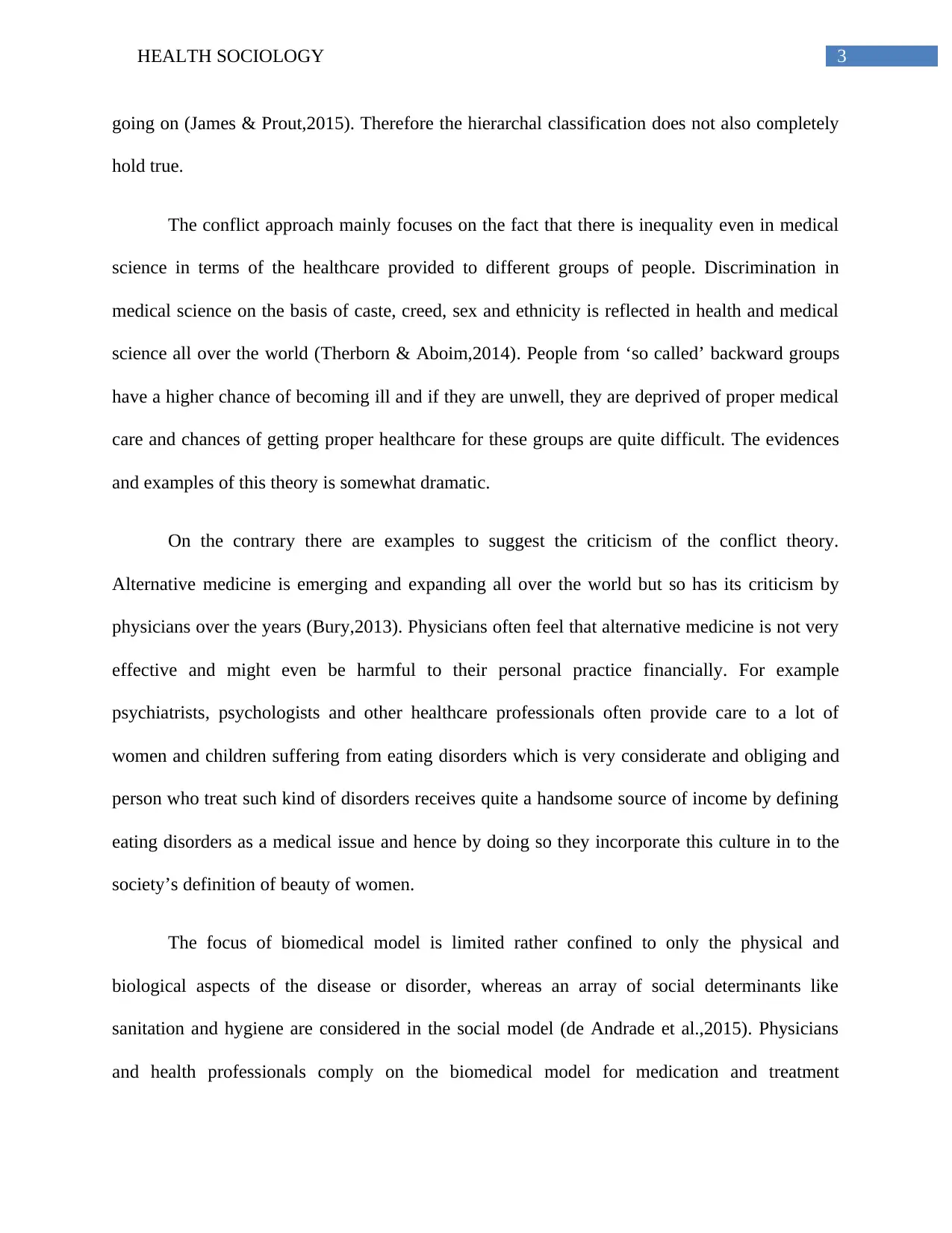
3HEALTH SOCIOLOGY
going on (James & Prout,2015). Therefore the hierarchal classification does not also completely
hold true.
The conflict approach mainly focuses on the fact that there is inequality even in medical
science in terms of the healthcare provided to different groups of people. Discrimination in
medical science on the basis of caste, creed, sex and ethnicity is reflected in health and medical
science all over the world (Therborn & Aboim,2014). People from ‘so called’ backward groups
have a higher chance of becoming ill and if they are unwell, they are deprived of proper medical
care and chances of getting proper healthcare for these groups are quite difficult. The evidences
and examples of this theory is somewhat dramatic.
On the contrary there are examples to suggest the criticism of the conflict theory.
Alternative medicine is emerging and expanding all over the world but so has its criticism by
physicians over the years (Bury,2013). Physicians often feel that alternative medicine is not very
effective and might even be harmful to their personal practice financially. For example
psychiatrists, psychologists and other healthcare professionals often provide care to a lot of
women and children suffering from eating disorders which is very considerate and obliging and
person who treat such kind of disorders receives quite a handsome source of income by defining
eating disorders as a medical issue and hence by doing so they incorporate this culture in to the
society’s definition of beauty of women.
The focus of biomedical model is limited rather confined to only the physical and
biological aspects of the disease or disorder, whereas an array of social determinants like
sanitation and hygiene are considered in the social model (de Andrade et al.,2015). Physicians
and health professionals comply on the biomedical model for medication and treatment
going on (James & Prout,2015). Therefore the hierarchal classification does not also completely
hold true.
The conflict approach mainly focuses on the fact that there is inequality even in medical
science in terms of the healthcare provided to different groups of people. Discrimination in
medical science on the basis of caste, creed, sex and ethnicity is reflected in health and medical
science all over the world (Therborn & Aboim,2014). People from ‘so called’ backward groups
have a higher chance of becoming ill and if they are unwell, they are deprived of proper medical
care and chances of getting proper healthcare for these groups are quite difficult. The evidences
and examples of this theory is somewhat dramatic.
On the contrary there are examples to suggest the criticism of the conflict theory.
Alternative medicine is emerging and expanding all over the world but so has its criticism by
physicians over the years (Bury,2013). Physicians often feel that alternative medicine is not very
effective and might even be harmful to their personal practice financially. For example
psychiatrists, psychologists and other healthcare professionals often provide care to a lot of
women and children suffering from eating disorders which is very considerate and obliging and
person who treat such kind of disorders receives quite a handsome source of income by defining
eating disorders as a medical issue and hence by doing so they incorporate this culture in to the
society’s definition of beauty of women.
The focus of biomedical model is limited rather confined to only the physical and
biological aspects of the disease or disorder, whereas an array of social determinants like
sanitation and hygiene are considered in the social model (de Andrade et al.,2015). Physicians
and health professionals comply on the biomedical model for medication and treatment
Paraphrase This Document
Need a fresh take? Get an instant paraphrase of this document with our AI Paraphraser
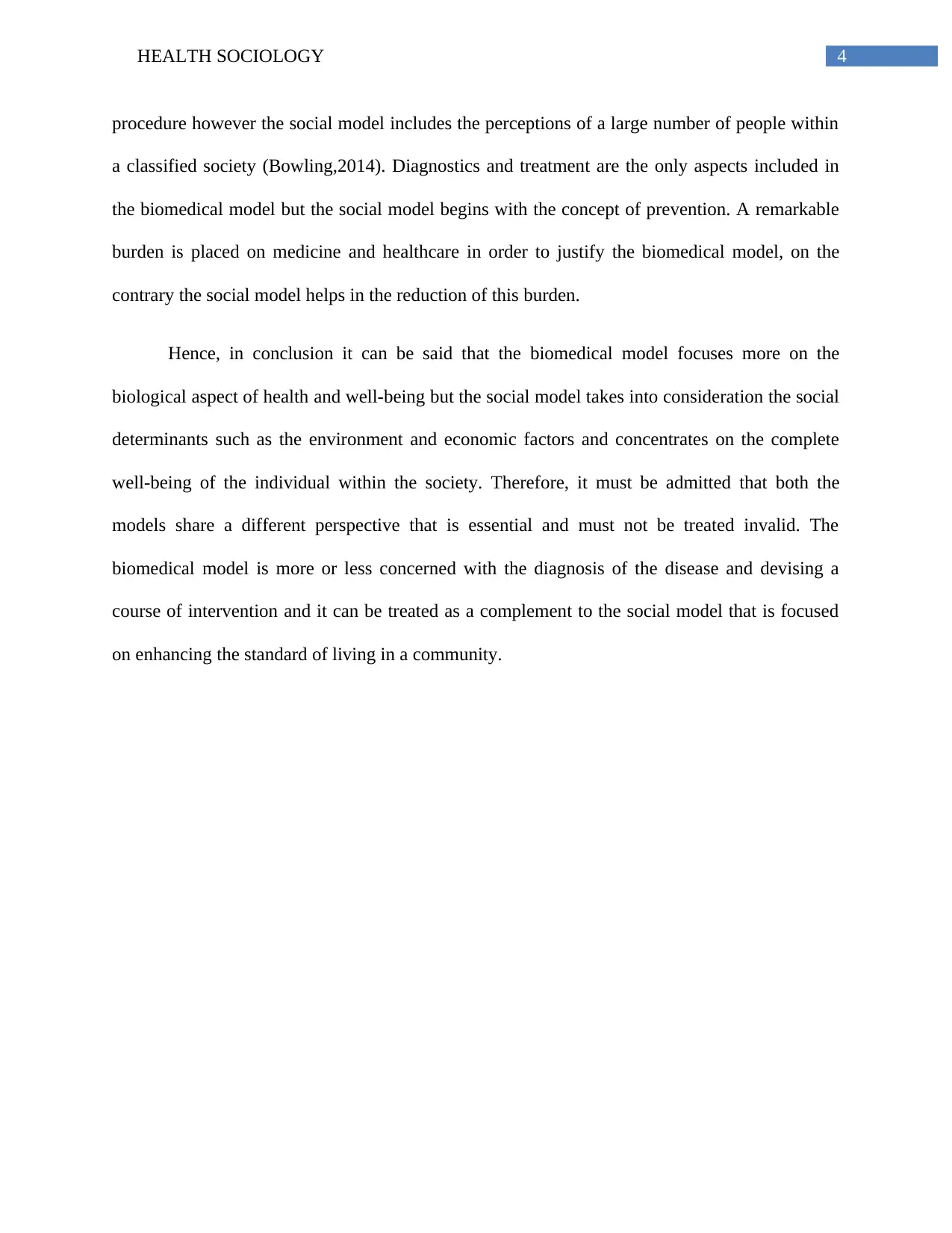
4HEALTH SOCIOLOGY
procedure however the social model includes the perceptions of a large number of people within
a classified society (Bowling,2014). Diagnostics and treatment are the only aspects included in
the biomedical model but the social model begins with the concept of prevention. A remarkable
burden is placed on medicine and healthcare in order to justify the biomedical model, on the
contrary the social model helps in the reduction of this burden.
Hence, in conclusion it can be said that the biomedical model focuses more on the
biological aspect of health and well-being but the social model takes into consideration the social
determinants such as the environment and economic factors and concentrates on the complete
well-being of the individual within the society. Therefore, it must be admitted that both the
models share a different perspective that is essential and must not be treated invalid. The
biomedical model is more or less concerned with the diagnosis of the disease and devising a
course of intervention and it can be treated as a complement to the social model that is focused
on enhancing the standard of living in a community.
procedure however the social model includes the perceptions of a large number of people within
a classified society (Bowling,2014). Diagnostics and treatment are the only aspects included in
the biomedical model but the social model begins with the concept of prevention. A remarkable
burden is placed on medicine and healthcare in order to justify the biomedical model, on the
contrary the social model helps in the reduction of this burden.
Hence, in conclusion it can be said that the biomedical model focuses more on the
biological aspect of health and well-being but the social model takes into consideration the social
determinants such as the environment and economic factors and concentrates on the complete
well-being of the individual within the society. Therefore, it must be admitted that both the
models share a different perspective that is essential and must not be treated invalid. The
biomedical model is more or less concerned with the diagnosis of the disease and devising a
course of intervention and it can be treated as a complement to the social model that is focused
on enhancing the standard of living in a community.
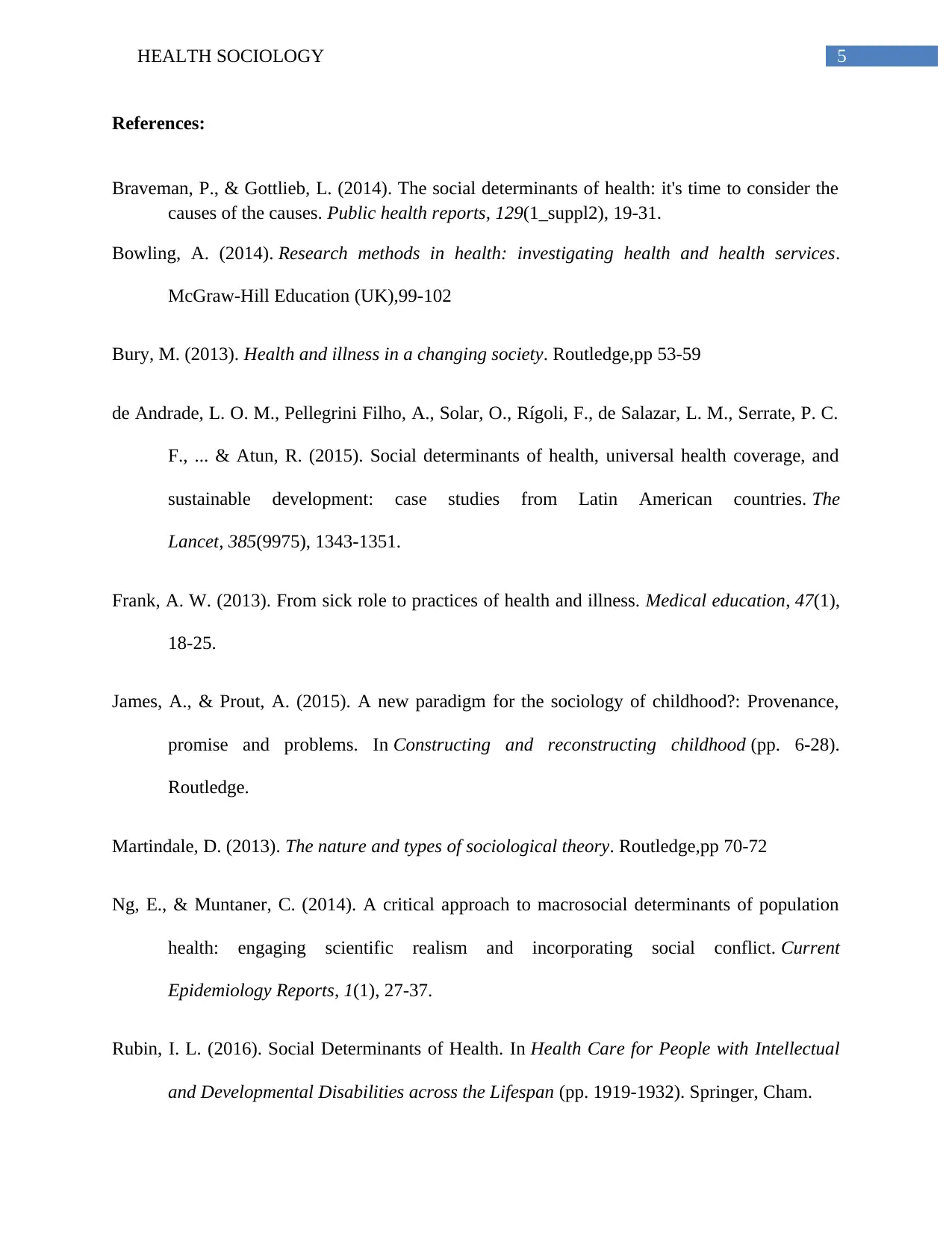
5HEALTH SOCIOLOGY
References:
Braveman, P., & Gottlieb, L. (2014). The social determinants of health: it's time to consider the
causes of the causes. Public health reports, 129(1_suppl2), 19-31.
Bowling, A. (2014). Research methods in health: investigating health and health services.
McGraw-Hill Education (UK),99-102
Bury, M. (2013). Health and illness in a changing society. Routledge,pp 53-59
de Andrade, L. O. M., Pellegrini Filho, A., Solar, O., Rígoli, F., de Salazar, L. M., Serrate, P. C.
F., ... & Atun, R. (2015). Social determinants of health, universal health coverage, and
sustainable development: case studies from Latin American countries. The
Lancet, 385(9975), 1343-1351.
Frank, A. W. (2013). From sick role to practices of health and illness. Medical education, 47(1),
18-25.
James, A., & Prout, A. (2015). A new paradigm for the sociology of childhood?: Provenance,
promise and problems. In Constructing and reconstructing childhood (pp. 6-28).
Routledge.
Martindale, D. (2013). The nature and types of sociological theory. Routledge,pp 70-72
Ng, E., & Muntaner, C. (2014). A critical approach to macrosocial determinants of population
health: engaging scientific realism and incorporating social conflict. Current
Epidemiology Reports, 1(1), 27-37.
Rubin, I. L. (2016). Social Determinants of Health. In Health Care for People with Intellectual
and Developmental Disabilities across the Lifespan (pp. 1919-1932). Springer, Cham.
References:
Braveman, P., & Gottlieb, L. (2014). The social determinants of health: it's time to consider the
causes of the causes. Public health reports, 129(1_suppl2), 19-31.
Bowling, A. (2014). Research methods in health: investigating health and health services.
McGraw-Hill Education (UK),99-102
Bury, M. (2013). Health and illness in a changing society. Routledge,pp 53-59
de Andrade, L. O. M., Pellegrini Filho, A., Solar, O., Rígoli, F., de Salazar, L. M., Serrate, P. C.
F., ... & Atun, R. (2015). Social determinants of health, universal health coverage, and
sustainable development: case studies from Latin American countries. The
Lancet, 385(9975), 1343-1351.
Frank, A. W. (2013). From sick role to practices of health and illness. Medical education, 47(1),
18-25.
James, A., & Prout, A. (2015). A new paradigm for the sociology of childhood?: Provenance,
promise and problems. In Constructing and reconstructing childhood (pp. 6-28).
Routledge.
Martindale, D. (2013). The nature and types of sociological theory. Routledge,pp 70-72
Ng, E., & Muntaner, C. (2014). A critical approach to macrosocial determinants of population
health: engaging scientific realism and incorporating social conflict. Current
Epidemiology Reports, 1(1), 27-37.
Rubin, I. L. (2016). Social Determinants of Health. In Health Care for People with Intellectual
and Developmental Disabilities across the Lifespan (pp. 1919-1932). Springer, Cham.
⊘ This is a preview!⊘
Do you want full access?
Subscribe today to unlock all pages.

Trusted by 1+ million students worldwide
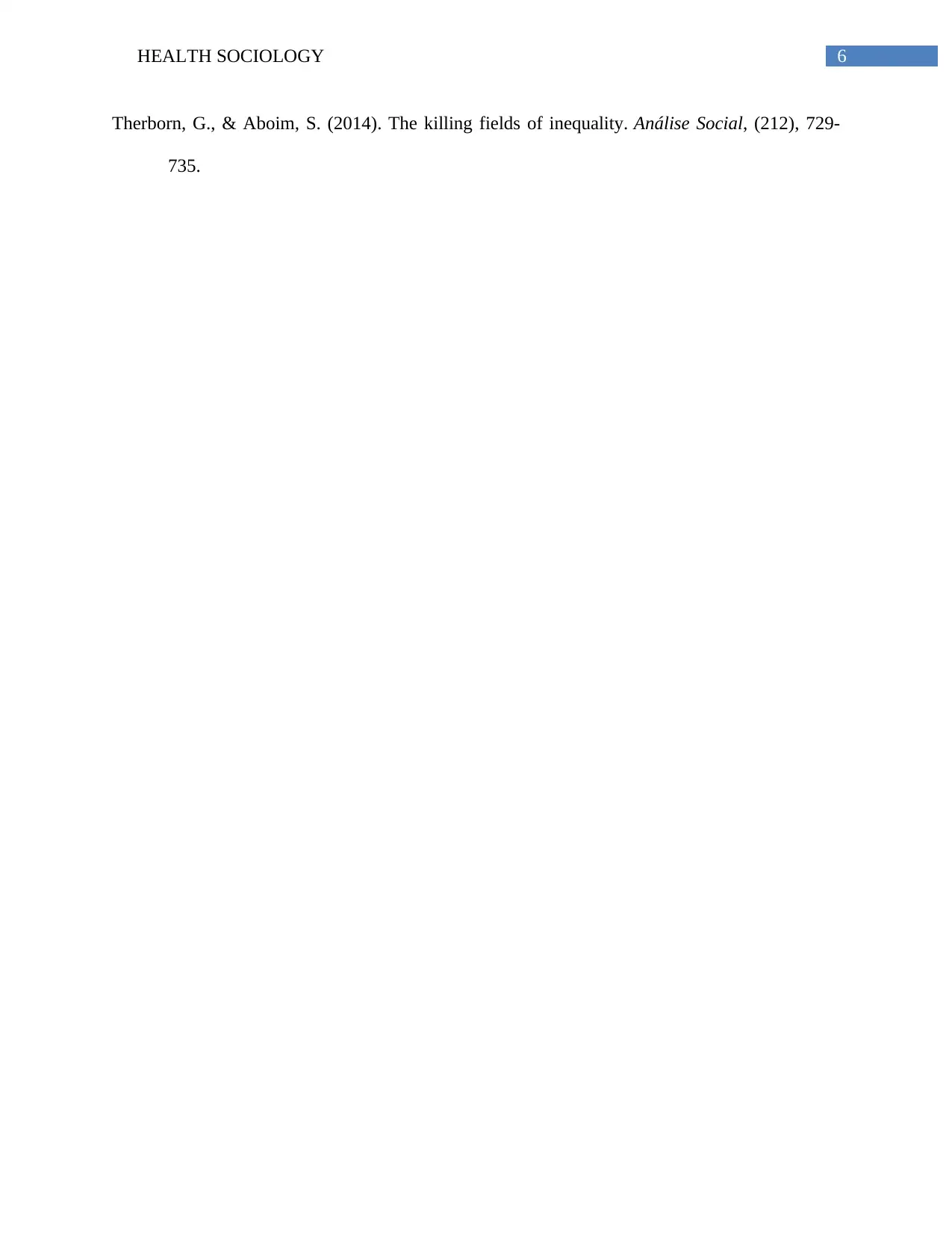
6HEALTH SOCIOLOGY
Therborn, G., & Aboim, S. (2014). The killing fields of inequality. Análise Social, (212), 729-
735.
Therborn, G., & Aboim, S. (2014). The killing fields of inequality. Análise Social, (212), 729-
735.
1 out of 7
Related Documents
Your All-in-One AI-Powered Toolkit for Academic Success.
+13062052269
info@desklib.com
Available 24*7 on WhatsApp / Email
![[object Object]](/_next/static/media/star-bottom.7253800d.svg)
Unlock your academic potential
Copyright © 2020–2025 A2Z Services. All Rights Reserved. Developed and managed by ZUCOL.





